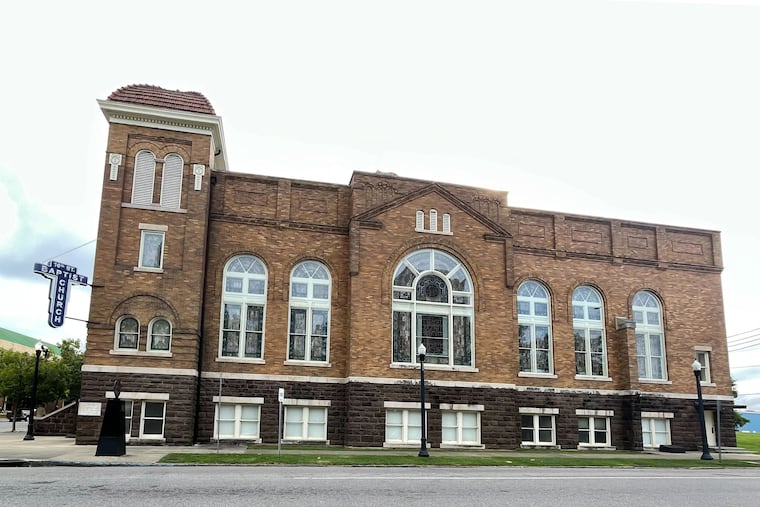A Philadelphia pastor leads the church where four girls died in a bombing 60 years ago. After my journey to pay homage, we talked.
The Rev. Arthur Price Jr. is the pastor of Sixteenth Street Baptist Church and a Philadelphia native.

When a trip south took me to Birmingham, Ala., this year, topping my must-see list was the historic Sixteenth Street Baptist Church, where four little girls were killed in a bombing in 1963.
I was a child growing up during the civil rights movement when the bombing happened on Sept. 15. I may have been young, but I still remember seeing myself in the faces of the four, innocent lives taken by unimaginable hatred as the congregation was just about to start the worship service with prayer. Terrified churchgoers took cover under pews as debris from the explosion rained down on them.
I was in town to attend the annual convention of the National Association of Black Journalists. But even with so much going on, my spirit drew me to the church along with two fellow journalists, Sonya Ross, a founder of Black Women Unmuted, a news site that tells the stories of Black women and politics, and Kia Johnson, a Washington-based reporter for Reuters.
We chatted on the short ride to downtown historic Birmingham, where the church still has an active congregation. As we approached the majestic edifice, a quietness fell over us as we solemnly approached the hallowed ground. Kia wept softly, tears running down her cheeks.
The church was closed, but — always journalists — we documented the moment with pictures and videos. I felt chills when I placed my hand on the beautiful stained-glass windows and touched the solid wood door that to me symbolized the strength and resilience of a congregation organized in 1873 as the first Black church in Birmingham.
On the wide concrete stairway that leads to the church’s front door, we stood near where the bomb was planted by Ku Klux Klan members. The four little girls had been in the basement, where Sunday school classes were held, when the bomb exploded. A fifth child lost her eye but survived the attack.
» READ MORE: Remembering 4 girls killed in church blast
With our hands joined, we reverently bowed our heads with those little girls on our minds. I led our sister circle in a heartfelt prayer. As I choked up, I squeezed their hands tight.
“God of our weary years, God of our silent tears,” I began, quoting from the Negro national anthem Lift Every Voice and Sing by James Weldon Johnson. Then added, “Let us always remember the innocent lives lost — speak their names — Addie Mae Collins, Denise McNair, Carole Robertson, and Cynthia Wesley.”
» READ MORE: Philly native shepherds Birmingham church
The Rev. Arthur Price Jr. is the pastor of Sixteenth Street Baptist Church and a Philadelphia native. For this year’s 60th anniversary of the bombing, we talked about how he balances leading a church that is a national historic landmark, and what he misses about the City of Brotherly Love.
Here’s what to know about the mission of this Birmingham pastor with Philadelphia roots.
The church membership was declining until he arrived
Born and raised in Philadelphia, the Temple grad, 58, received a master of divinity from Colgate Rochester Crozer Divinity School in 1995. Before he came to Birmingham, he was associate pastor at St. Matthews Baptist Church in Williamstown, Gloucester County. At the time that he was called to pastor Sixteenth Street Baptist in 2002, membership had declined and the church was in a rebuilding mode.
He said he added outreach programs, including a feeding ministry and a partnership with the city to assist drug offenders.
“Once we took care of God’s business, everything else kind of fell into place,” and membership grew drastically, he said.
He tries to balance the congregation’s needs with visitor demand
Becoming the pastor has had its challenges, but Price said he believes he has met the demand from visitors. He started a tour ministry so the public can come inside to learn how the church survived the bombing. ln 2006, the church was placed on the National Register of Historic Places. The surrounding area of the church has attractions, including the Birmingham Civil Rights Institute across the street.
“People would come and knock on the door because they wanted to see the history,” he said. The church gets 50,000 to 70,000 visitors annually.
Sixteenth Street Baptist Church remains at the forefront in the fight for equal rights, as it was in the 1960s when it was the headquarters for civil rights meetings and rallies. To mark the 60th anniversary of the bombing, the church invited Supreme Court Justice Ketanji Brown Jackson, the first Black woman on the nation’s highest court, to be the keynote speaker.
“It is still needed for the church to speak out on issues,” Price said. “If we don’t speak up and speak out, our voices get silenced.”
He’s still an Eagles fan
His mother and siblings still live in Philadelphia, and he gets home several times a year. He attended the Philadelphia Eagles’ training camp this year and closely follows his favorite players, Jalen Hurts and DeVonta Smith.
He occasionally gets teased about his Northern accent, but the community has warmly embraced him.
“They have Tastykakes down here, so I don’t miss them anymore,” he said. “As I tell people in Alabama, being a Philadelphia fan is not a choice.”